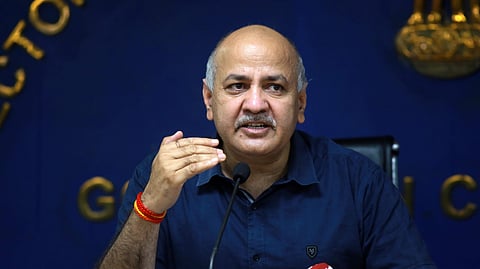

Delhi Deputy Chief Minister Manish Sisodia has opined that the age-old state-level education laws are a major hindrance in implementing the new National Education Policy (NEP). The minister was addressing the two-day national conference of education ministers being held in Gandhinagar, Gujarat, when he made this statement on Thursday, June 2. The conference is focused on devising steps to implement the NEP, which was framed in 2020.
Sisodia, who is also Delhi's education minister, said that unlike the national capital, the condition of 95-98 per cent of government schools across the country was extremely poor, barring only a few "showpiece schools" in each state. He said further that the pre-primary education system in India lacks a framework, is not well regulated and varies within the states themselves. He also stated that without a new legal framework, the NEP will merely be reduced to a set of guidelines, as reported by PTI.
"The recommendations of the recently introduced National Education Policy are progressive, but it needs an enabling legal framework to realise its full potential. There are many provisions in different state education laws which are restricting the proper implementation of the NEP," he said during the National Conference of School Education Ministers in Gandhinagar, Gujarat. There is a need for a new legal framework for NEP to align it with the forward looking provisions of the NEP 2020. Otherwise, the policy will not be able to cross the hurdles created by existing legal provisions and age-old practices," he said.
The minister pointed out two barriers in the implementation of NEP. "First, the age-old rules and regulations governing the functions of the education departments across the country. Some of the rules and regulations created just after independence continue to be in existence even today. These are not only irrelevant in present times, but are a hindrance in the way of NEP. Therefore, a new legal framework is needed to make the new education policy successful. For example, in the Gujarat Primary Education Act 1961, primary education (Class I-VII) is compulsory, but parents are legally responsible for this. There is no mention of curriculum, training and assessment in this Act," he explained further.
"Similarly, the Primary Education Act in Punjab, made in 1960, is also similar where parents can be compelled to send their children to school and parents can be fined for not sending them (to school). Uttar Pradesh's Basic Education Act made in 1972 talks about the education board there, while Kerala's Education Act made in 1952 talks about regulating aided schools," he added, saying that the second barrier was related to practice legacy.
"We talk about inclusive education in our policies, but does the teacher, while completing the curriculum in the classroom, guarantee that every child has a space for learning at their own pace. Are we training our future teachers to practice inclusion in our BEd curriculum? We need to ensure that when teachers enter the classroom, they are not only masters of their subject, but have also deeply absorbed the principles of inclusive development as their basic character," the Minister said.
"In the NEP, the maximum focus has been given on the first five years. This is in sync with the thought around early childhood education globally. But the pre-primary education system in India is very unsystematic and varies in each state. The anganwadi focuses on 0-6 years, play schools have their own standards and class 1 has a different criteria (sic). Whereas the new education policy focuses on foundational learning in the first 5 years. In such a situation, we need to have an implementation framework that really sets the foundation for lifelong learning," he said further.
Talking about the National Achievement Survey (NAS), the minister said that the central government's NAS for schools should not end up being only a high-stakes exam. "In India, we have a traditional annual examination process of three hours which decides the future of the children. This causes a lot of stress on schools and leads to pressure on students to pass the exam. I fear that NAS is also shifting on the same lines, where getting high scores in NAS has become the priority of state education departments. This will create additional pressure on students. The government should look into the framework of NAS too and look for new assessment processes," he elaborated, as reported by PTI.
